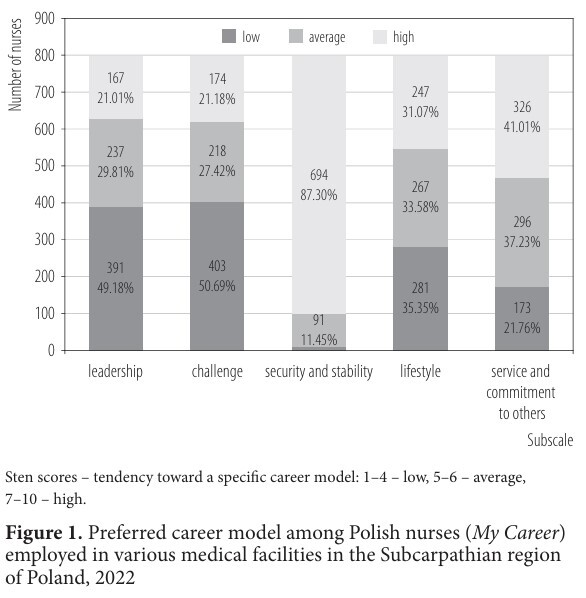Online first
Current issue
Archive
Most cited in 2024
About the Journal
Editorial Office
Editorial Board
Copyright and self-archiving policy
Information clause on the processing of personal data
Declaration of accessibility
Instructions for Authors
Instructions for Reviewers
Contact
Reviewers
2024
2023
2022
2020
2021
2019
2018
2017
2016
2015
2014
2013
Editing and translations
ORIGINAL PAPER
Career models, job satisfaction, and type of work-related behavior presented by Polish nurses: A cross-sectional post-COVID-19 study
1
University of Rzeszow, Rzeszów, Poland
(College of Medical Sciences, Institute of Health Sciences)
Online publication date: 2024-03-12
Corresponding author
Anna Bartosiewicz
University of Rzeszow, College of Medical Sciences, Institute of Health Sciences, Rejtana 16 C, 35-959 Rzeszów, Poland
University of Rzeszow, College of Medical Sciences, Institute of Health Sciences, Rejtana 16 C, 35-959 Rzeszów, Poland
Med Pr Work Health Saf. 2024;75(1):19-30
KEYWORDS
TOPICS
ABSTRACT
Background: Nurses constitute a crucial professional group within the healthcare system. Job satisfaction and opportunities for professional development directly impact the quality of medical services provided and help prevent burnout. The study aimed to assess the preferred career model, the level of job satisfaction, and determine the type of work-related behavior presented by Polish nurses. Material and Methods: A cross-sectional survey was conducted among 795 nurses after the COVID-19 pandemic. Three standardized scales were used: My Career questionnaire to access the preferred career model, the Job Satisfaction Scale, and Work‑Related Behavior and Experience Patterns (Arbeitsbesorgenes Verhaltens und Erlebenmuster – AVEM) questionnaire assessing types of work-related behavior. Descriptive statistics, Spearman’s correlation coefficient, and multiple linear regression were used for analysis of data. Results: The results concerning the relationship between the types of work-related behavior, job satisfaction, and the preferred career model revealed that type G (healthy) was significantly and positively correlated (p < 0.05, r > 0) with the Challenge subscale of the career model (r = 0.095, p = 0.007) and job satisfaction (r = 0.136, p < 0.001). The higher the score on the Challenge subscale and greater job satisfaction, the more pronounced type G personality. The multiple linear regression models explained only 2.5 to 5% of the variability of studied questionnaire outcomes but indicated that significant, independent predictors for the My Career questionnaire subscales and AVEM raw scales for each type were additional qualifications, level of education, work experience, and place of work. Significant predictors of the job satisfaction scale were employment in private healthcare facilities and a master’s degree. Conclusions: Nurses experience job satisfaction, but the workload, demanding daily tasks, and the sense of responsibility can lead them to feel fatigued and burnt out. The preferred career model involves Security and Stability, as well as Service and Commitment to other domains. Only a small percentage of the variability in the results of the analyzed dependent variables was explained by the explanatory variables included in the model. Med Pr Work Health Saf. 2024;75(1):19–30
Share
RELATED ARTICLE
We process personal data collected when visiting the website. The function of obtaining information about users and their behavior is carried out by voluntarily entered information in forms and saving cookies in end devices. Data, including cookies, are used to provide services, improve the user experience and to analyze the traffic in accordance with the Privacy policy. Data are also collected and processed by Google Analytics tool (more).
You can change cookies settings in your browser. Restricted use of cookies in the browser configuration may affect some functionalities of the website.
You can change cookies settings in your browser. Restricted use of cookies in the browser configuration may affect some functionalities of the website.






